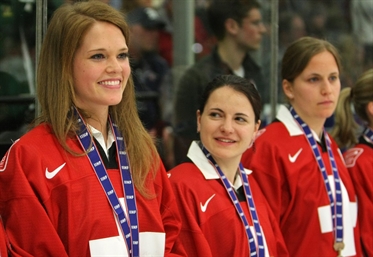Hoping for Burlington repeat
Hoping for Burlington repeat
Swiss women strive against all odds

 Swiss goalkeeper Florence Schelling is all smiles after leading her team to a bronze medal win against Finland in the 2012 IIHF Ice Hockey Women’s World Championship – a surprise the Swiss would love to repeat in Sochi. Photo: Dave Sandford / HHOF-IIHF Images
Swiss goalkeeper Florence Schelling is all smiles after leading her team to a bronze medal win against Finland in the 2012 IIHF Ice Hockey Women’s World Championship – a surprise the Swiss would love to repeat in Sochi. Photo: Dave Sandford / HHOF-IIHF Images
For Sochi, the small but enthusiastic Swiss women’s hockey family is working hard for a positive outcome.
The Swiss hit the headlines during the 2012 IIHF Ice Hockey Women’s World Championship in Burlington, USA, when they surprisingly ended up in the semi-finals for only the second time in history and even won bronze against Finland.
It was a performance that came in good timing since the seeding for the Olympics are determined two years in advance and the Swiss moved up to fourth place in the Women’s World Ranking. Not only did the team earn direct qualification to Sochi 2014 as a top-six nation but they were even seeded in the higher of the two tiered groups with Canada, Finland and the United States. Expectations are that the Swiss will finish among the bottom two teams and play a quarter-final game against one of the top-two teams from the other group that includes host Russia, Sweden, Germany and Japan.
Being seeded fourth is an honour and challenge at the same time for the team and the staff, as the 2013 IIHF Ice Hockey Women’s World Championship with a similar preliminary-round schedule showed.
The Swiss started with a narrow 2-1 defeat to Finland and remained scoreless against Canada (13-0) and Team USA (5-0) before suffering a 2-1 loss in the quarter-finals to Russia and a 5-3 loss in the placement game against Germany.
That’s exactly what the Swiss want to avoid this year.
“We’re on the right track and we’re aware that we didn’t perform well in our last World Championship. The difference between the teams in our neighbourhood is very small,” says René Kammerer, the head coach of the Swiss women’s national team.
Continue readingThis time the schedule will be similar. Switzerland will open against defending champion Canada on 8th February before facing Team USA and Finland.
“We’ll have difficult opponents. We have to play very well. We take these games serious but we need to be realistic with our expectations,” Kammerer says.
“The game against Finland will show where we are. It will be an important game to be ready for the quarter-finals no matter against whom we play. We know it’s impossible to take the first three games lightly and then suddenly move up a gear.
“After the quarter-finals it will be open. If we win we play for medals. That’s our goal. If you lose that game you have to play against relegation. It’s a special situation but that’s sport.”
For Kammerer it’s hard to predict how the games against the North American opponents will end. He feels his team has improved but at the same time he’s aware how much resources their counterparts have invested in centralized teams.
And that’s where Switzerland has the biggest deficit not only compared to the North Americans but also to other top-tier European nations. While women’s hockey has bigger support by club teams in Finland and Sweden, extra government funding in Russia in view of Sochi 2014 and the support through army programs in Germany, the Swiss have, well, nothing of that sort.
With ZSC Lions Zurich and HC Lugano only two clubs from the 12-team top men’s league are also represented in the top women’s league. Unsurprisingly it’s these two teams that reach the final of the women’s league almost every year and have the most national team players.
Switzerland has only 908 registered female players. That’s less than half the number Germany or Japan – the two bottom-seeded countries in Sochi – has.
“The level of women’s hockey in Switzerland is good but there’s stagnation because the big professional clubs don’t open the door for women’s hockey. That’s something we notice,” Kammerer said. “Other teams invest much more. We just don’t do that in Switzerland.”
Same as in men’s hockey, the Swiss women are in the underdog’s role despite the bronze medal two years ago. They cannot take a medal for granted but they know it’s not impossible either. They have had several players in bigger leagues abroad. Especially practising and playing under professional circumstances in the NCAA helped increase the skill level for some of the players but those get back to reality once they graduate.
One such example is goalkeeper Florence Schelling, whose stellar performance was one of the main reasons behind the team finishing fourth in 2008 and third in 2012. In that year she was named Best Goalkeeper of the Women’s Worlds, and she also reached the top-three for the Patty Kazmaier Memorial Award for the best female NCAA hockey player.
After finishing her college career, she tried out the Canadian Women’s Hockey League, usually regarded as the strongest non-collegiate women’s hockey league. But while being on the ice daily before, her team just had one ice practice and two games per week. For better preparation for Sochi she returned to Switzerland after one year and plays for EHC Bülach of the third-tier men’s league where she has four practices and two games a week.
“It’s a different and more aggressive game,” Schelling says. “Sometimes it’s difficult to switch back to women’s hockey but it has to work.”
And the Swiss will definitely have to rely on strong goaltending if they want to reach another upset. And that’s what they want. “We want to play in the medal games,” Schelling says.
While the defensive department will be virtually unchanged compared to Vancouver 2010 with Schelling slotted as number-one goalie and only one change among defenders, the Swiss will count on more youth in the offence since former standouts are beyond their heydays or couldn’t afford to participate in the increasingly intense national team program due to their daily job. Among the Vancouver 2010 forwards missing in Sochi are veterans Kathrin Lehmann and Christine Hüni (née Meier), the latter despite being the scoring leader of the domestic league.
That’s a sign that competition in women’s hockey and the training needed to become a top athlete for Sochi has increased.
“If you want to go to the Olympics, you have to invest a lot and the depth is bigger. We had off-ice practices in summer and several tournaments with all the travel in Europe and even to Japan,” Kammerer said. “It would be wrong to nominate somebody who hasn’t been part of the process.”
The selections are done and Kammerer and his players are looking forward to an amazing event after months of hard work.
“We will play in an outstanding women’s ice hockey tournament and in the athletes’ village the players will have the chance to talk with stars from hockey and other sports. I remember we sat on the same table with Alexander Ovechkin and [former Soviet coach] Viktor Tikhonov,” Kammerer recalls.
“The Olympics are always a great experience and we know how much Russians love hockey.”
Projected Result:
The Swiss have never won against Canada or the U.S. and are also the underdog against Finland. In the quarter-finals they will face an opponent from Group B with a history of wins and losses. After that crucial game, anything from a bronze medal to a relegation battle can happen.
Top-3 Players:
Florence Schelling: Switzerland is well-known for great goaltending and Schelling has shown world-class performances on the women’s side both at the international stage and in college hockey. She can be a deciding factor for her team’s fortune.
Julia Marty: A defender with offensive skill. Like her twin sister Stefanie, she can be a difference maker in the tight and decisive games at both ends. Both tried to optimize their preparation by joining Linköpings HC of the Swedish league after graduating in the U.S.
Sara Benz: Another twin sister (with Laura) on the team, the forward recovered recently from an injury and showed her offensive skill in domestic play and an international tournament earlier this month.
Dark Horse:
Alina Müller: She might well be the youngest hockey player of the upcoming Olympics – and as a 15-year-old yet miles away from her peak. But the younger sister of San Jose Sharks first-round pick Mirco Müller has shown her talent in boys’ hockey and this season also with the senior women’s national team to earn a spot in Sochi. A promise for the future.
Back to Overview







































